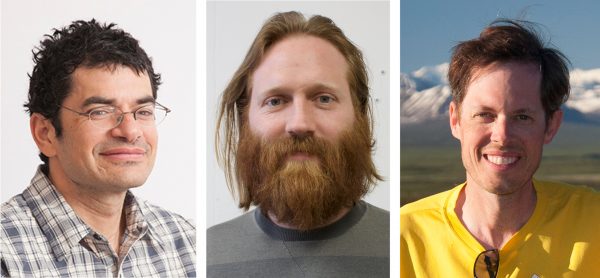Three UAF researchers receive individual NSF awards
October 3, 2018

Three University of Alaska Fairbanks researchers have received substantial individual awards from the National Science Foundation. The awards will fund Jeff Benowitz, R. Eric Collins and Ken Tape to further their research by collaborating with scientists in Oregon, Massachusetts and Arizona, respectively.
Benowitz, a research assistant professor with the Geophysical Institute, received $220,043 for his proposal “Why are Young Volcanic Rocks Undateable: Chemistry, Environment, or Instrumentation?” The funding will enable Benowitz and a graduate student to work with researchers at Oregon State University to determine the age of young volcanic rocks from Alaska’s Aleutian and Wrangell arcs. The project will investigate how the chemistry and environments of samples and the sensitivity and precision of instruments contribute to uncertainties in determining the age of young volcanic rocks, and enable the development of new methods to more accurately date the rocks.
Collins, an assistant professor with the College of Fisheries and Ocean Sciences, received $187,000 for his proposal “Advancing Machine Learning in Biological Oceanography Through Interdisciplinary Collaborations.” Collins and a graduate student will travel to the Woods Hole Oceanographic Institution in Massachusetts to use machine learning to predict distributions of Arctic marine microbes and their use and transformations of metals. They’ll then use this knowledge to design methods for adaptive biological sampling using flow-through systems and ocean profilers.
Tape, an associate professor with the Geophysical Institute's Snow, Ice and Permafrost Group, received $200,382 for his proposal, “Predicting Beaver Colonization of the Arctic and Creation of Tundra Stream Oases.” Tape and a postdoctoral researcher will spend six months at Northern Arizona University working with experts in satellite image analysis to further his research into the expansion of beaver habitat into Arctic tundra.
The three Track-4 awards were made through the nationwide Established Program to Stimulate Competitive Research, which was established by Congress to support research in areas of the country that have traditionally received relatively small amounts of federal research funding. Twenty-six states and territories now receive or are eligible for EPSCoR funds.


